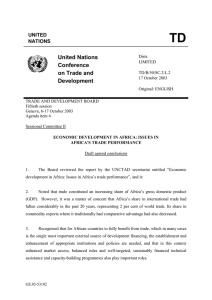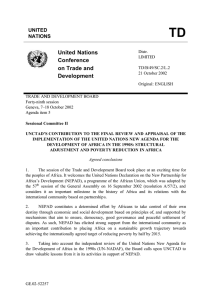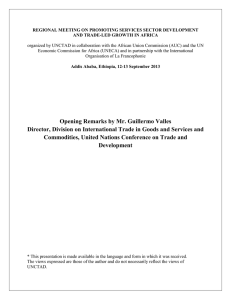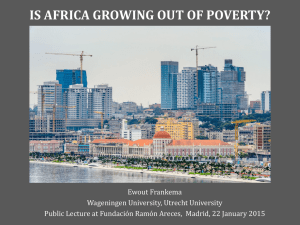TD United Nations Conference
advertisement
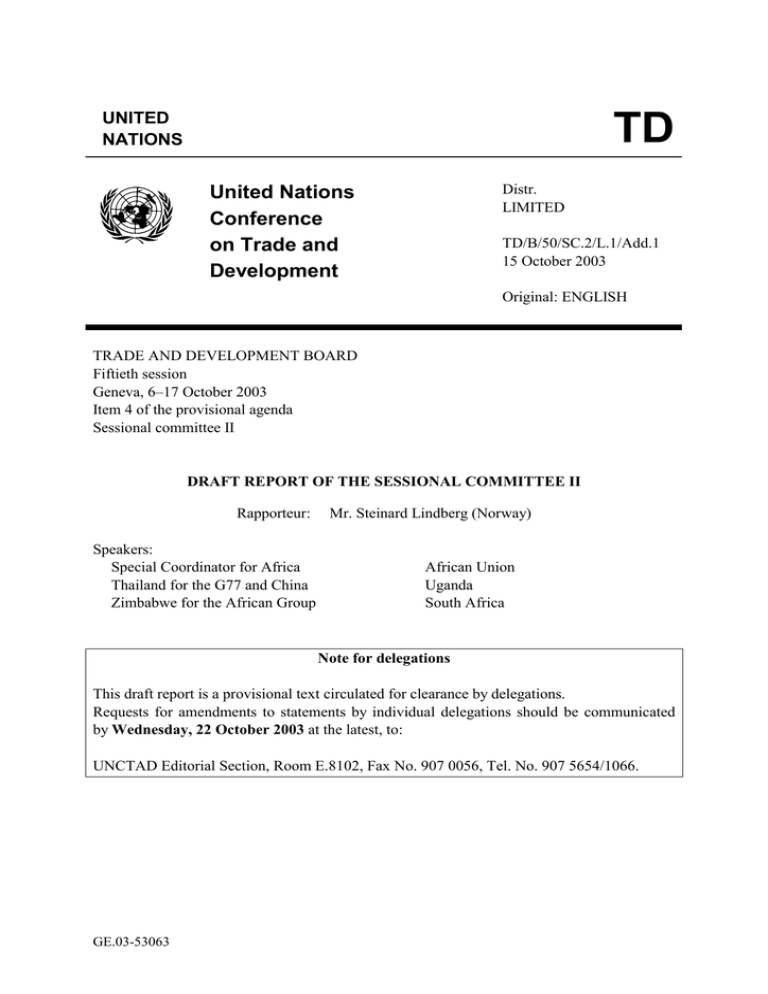
TD UNITED NATIONS Distr. LIMITED United Nations Conference on Trade and Development TD/B/50/SC.2/L.1/Add.1 15 October 2003 Original: ENGLISH TRADE AND DEVELOPMENT BOARD Fiftieth session Geneva, 6–17 October 2003 Item 4 of the provisional agenda Sessional committee II DRAFT REPORT OF THE SESSIONAL COMMITTEE II Rapporteur: Speakers: Special Coordinator for Africa Thailand for the G77 and China Zimbabwe for the African Group Mr. Steinard Lindberg (Norway) African Union Uganda South Africa Note for delegations This draft report is a provisional text circulated for clearance by delegations. Requests for amendments to statements by individual delegations should be communicated by Wednesday, 22 October 2003 at the latest, to: UNCTAD Editorial Section, Room E.8102, Fax No. 907 0056, Tel. No. 907 5654/1066. GE.03-53063 TD/B/50/SC.2/L.1/Add.1 page 2 ECONOMIC DEVELOPMENT IN AFRICA: ISSUES IN AFRICA’S TRADE PERFORMANCE 1. The Special Coordinator for Africa introduced the item by giving an overview of the secretariat' s report entitled "Economic development in Africa: Issues in Africa's trade performance". The report demonstrated that commodity dependence had been the Achilles heel of African development. Africa needed to diversify its productive and export base in order to break out of the poverty trap. Diversification required financial resources and expertise. In order to increase the level of investment and to reach the Millennium Development Goals, additional official financial flows, deeper and faster debt relief, and a substantial increase in private financial flows were required. 2. The representative of Thailand, speaking on behalf of the Group of 77 and China, said that the findings of the secretariat's report on Africa's trade performance were confirmed by the “Report of the meeting of eminent persons on commodity issues” (TD/B/50/11). The commodity problem had been a matter of concern since the drafting of the Havana Charter in 1947, and one of the major preoccupations of UNCTAD since its establishment. Commodity dependence, the secular decline in prices and the resulting terms-of-trade losses were acute not only for Africa and the least developed countries (LDCs), but also for many other developing countries. Agricultural trade liberalization and reliance on market forces had been purported to be the most efficient means of achieving a more efficient allocation of resources in the developing countries. However, the huge subsidies to farmers and the continued application of tariff escalation and tariff peaks were deemed necessary in order to protect farmers and producers in the developed countries from competition, excessive price movements and income disparities. Exports of non-fuel primary commodities had increased since 1980 in all regions except Africa, whose exports had fallen. In value terms, Africa's share in world exports had declined from 6.3 per cent in 1980 to 2.5 per cent in 2000. Exports from the developed countries had risen during the same period from some $200 billion to about $350 billion, equivalent to the annual subsidies provided to agriculture in the OECD countries. These subsidies had led to the impoverishment of millions of farmers in the developing countries. Diversification therefore remained a major challenge for developing countries, in particular in sub-Saharan Africa and the LDCs, but these countries needed to derive sufficient gains from their commodity exports and to be able to increase investment for such diversification. 3. Africa had been unable acquire cheap external financing, and to ensure efficient logistics and the necessary human resources and skills which were critical for success in international trade. Poor farmers were unable to negotiate with large multinational trading companies for a fair price for their produce. UNCTAD should study possible arrangements for cooperation between commodity producers, and for linking producers with consumers. The abuse of market power by a few major multinational trading and processing companies should be analysed within the context of rules governing competition. The dismantling of State institutions in the context of adjustment programmes was an additional factor in reducing farm-gate prices. Crop marketing boards, which among other things had mediated TD/B/50/SC.2/L.1/Add.1 page 3 between world prices and producers and provided greater leverage in negotiations with buyers, had not been replaced by market-based mechanisms. Since agriculture remained the mainstay of African economies, there was a need to re-establish such institutional capacities in order to assist African farmers, and encourage diversification and economic transformation. International funding of diversification programmes should be revisited, as suggested in the eminent persons’ report. A quick-disbursing and highly concessional financing mechanism was required in order to compensate African countries for losses resulting from short-term price fluctuations. Consideration should also be given to compensating poor countries for losses resulting from the provision of subsidies that were equivalent to dumping. The linkages between trade and poverty, and the ways in which trade contributed to the global efforts to reduce poverty, should be given an appropriate place in the run-up to UNCTAD XI and at the Conference itself. The potential for increasing trade in the context of emerging markets, including both South−South trade and intra-African trade, should be studied further by the UNCTAD secretariat. 4. The representative of Zimbabwe, speaking on behalf of the African Group, said that Africa had experienced a steep decline in its share in world trade in general and in primary commodity exports in particular. Most countries in the region had been unable to diversify into manufactured exports and remained highly commodity-dependent. The short-term instability of primary commodity prices and secular real price declines had aggravated problems of economic management for most Governments. The loss of market shares for cotton and sugar was largely attributable to high subsidies and domestic support for less competitive producers in the United States and Europe. Deteriorating terms of trade, low levels of savings and investment, and reduced levels of official development assistance, in addition to the continuing debt overhang, underscored the marginalization of Africa. It was therefore no surprise that Africa would be unable to achieve the Millennium Development Goals. 5. The strong international support for NEPAD should be translated into concrete action to address the multifaceted needs of the region. There was a need for an exit solution to the debt overhang of African countries, by way of debt cancellation, to enable additional investment in the development of human capital and physical infrastructure. Even for some of the few heavily indebted poor countries (HIPCs) that had reached completion point under the enhanced HIPC initiative, the debt stock remained unsustainable. This called into question the assumptions underlying the debt sustainability analysis. Eight countries currently eligible for interim debt relief would most likely take longer than anticipated to reach their completion points in view of exogenous shocks and other problems, including fiscal slippages. Moreover, nine conflict-afflicted or post-conflict HIPCs were unlikely to reach decision point before the expiration of the HIPC sunset clause at the end of 2004. There was a need for more flexible rules of origin to enable African countries to take maximum advantage of preferential market access schemes such as the African Growth and Opportunity Act and the Everything But Arms initiative, and for the elimination of tariff peaks and tariff escalation, as well as for a less protectionist application of contingency trade protection measures. It was to be hoped that the multilateral trade negotiations on the Doha Development Agenda would restart soon, to address the issue of liberalization of trade in TD/B/50/SC.2/L.1/Add.1 page 4 agriculture, including a significant reduction, and finally elimination, of massive agricultural subsidies and support by OECD countries for commodities such as cotton, groundnuts and sugar, which were of major export interest to Africa. Enhanced technical-assistance and capacity-building programmes were necessary in order to tackle the supply-side constraints on diversification and the full utilization of existing market access opportunities. African Governments had to ensure sound macroeconomic management and poverty reduction, and should promote horizontal and vertical diversification towards higher-value-added products. 6. The representative of the African Union said that African leaders had demonstrated the political will to take ownership of Africa's development by launching the African Union and NEPAD, and by establishing an African Commodity Exchange Market. Regional integration initiatives were building blocks for the African Economic Community and the integration of African countries into the multilateral trading system. Africa's efforts to meet the Millennium Development Goals and the objectives of NEPAD were impaired by agricultural subsidies in the developed countries. The African Union and its member States were disappointed by the failure in Cancún to reach agreement on the cotton initiative and the proposal to adopt a work programme on commodity issues. Africa's development partners should make increased efforts to meet the internationally agreed official development assistance target of 0.7 per cent in order to help the countries of the region to bridge the savings and investment gap. 7. The representative of Uganda said that Africa’s place in the world trading system was of great concern to African policy makers and their development partners. UNCTAD was to be commended for keeping Africa’s problems on the international agenda. As the secretariat's report on the region's trade performance had highlighted, Africa’s share in world trade had been falling consistently as the region had remained dependent on exports of a few primary commodities whose prices had been very unstable and subject to secular decline. Unlike other regions, Africa had been unable to diversify into manufactures and other dynamic exports. A reversal of this situation was essential in order to achieve sustained development. So far, the efforts of African countries to implement economic reforms with an outward orientation had not succeeded in reducing the region's commodity dependence; they required concerted international support to yield the desired results. The loss of export revenues had contributed to the debt overhang in Africa, and many African countries eligible for debt relief under the HIPC Initiative were unlikely achieve debt sustainability at their completion point or beyond. This was largely due to commodity price trends, which had also had serious effects on the incidence of poverty. African countries did not have the instruments and technical expertise to cope with commodity price shocks. The policy responses had to take into account the characteristics of the different commodities and the specificities of their markets. Action was also needed on several fronts to address the structural constraints of the African economies. For greater diversification into more dynamic and higher-value-added products, external assistance to achieve qualitative and technical upgrading and to strengthen linkages with foreign markets was essential. African countries also depended on a substantial increase in official financial flows to help bridge their investment gap, and on a permanent solution to their debt problems. TD/B/50/SC.2/L.1/Add.1 page 5 8. The representative of South Africa said that the Doha work programme remained the primary vehicle through which Africa could be integrated into the global trading system, although some issues in the area of commodities and trade preferences remained either outside the framework of negotiations or were reflected in it only marginally. The report provided by the secretariat as a background to this item was helpful in clarifying and putting into perspective many of the issues of great relevance to Africa's trade performance, such as its dependence on primary commodity exports, the negative impact of subsidies on cotton, the region's poor participation in the most dynamic economic activities, the implications of volatility and the secular decline of many primary commodity prices, and the impact of terms-of-trade losses. Diversification and improved market access were of the utmost importance for Africa. The NEPAD secretariat, together with UNCTAD, had established a Market Access Initiative for seeking solutions to Africa's trade problems, and its success would very much depend on the completion of the Doha work programme. Given Africa's resource constraints, debt relief, increased official development assistance and transfer of technology and other forms of knowledge could help African countries meet the challenge of diversification. The analysis of various preferential market access schemes by the secretariat had helped to identify possibilities for rendering such schemes more effective. In the aftermath of Cancún, UNCTAD had an opportunity to revive confidence in the multilateral trading system. UNCTAD XI should serve to enhance dialogue at a high level towards a concrete strategy addressing Africa's problems. _______


